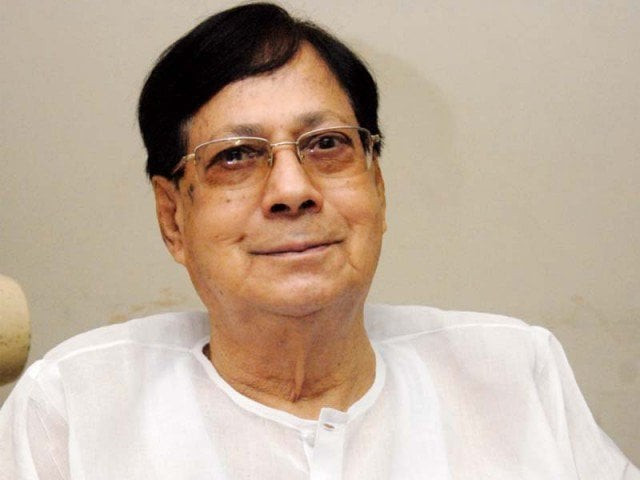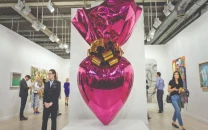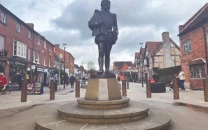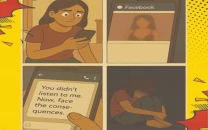Actor, playwright Kamal Ahmed Rizvi passes away
The man behind ‘Alif Noon’ suffered a heart attack at his home in Karachi

Kamal Rizvi was the man behind one of the most celebrated sitcoms in the country’s history, ‘Alif Noon’. PHOTOS: ASHRAF MEMON/EXPRESS
Rizvi succumbed to protracted illness in Karachi on Thursday. “I saw a ticker on TV that said Kamal sahib was ill for a while. He was actually ill since August 14, 1947, I can assure you that,” says satirist Anwar Maqsood. Veteran playwright Haseena Moin recalls her last meeting with Rizvi. “It was just like yesterday when we met at Alhamra in Lahore. I am taken aback by his death. It’s a sad day indeed.”
Rizvi headlined one of the most celebrated sitcoms in the country’s history, Alif Noon. The show was so popular that when he once took his car to a workshop, the mechanic refused to repair it, saying he had to go watch an episode of Alif Noon that was being aired at that moment. “Alif Noon was his most significant contribution. He was a short-tempered man hence I always tried to keep a distance from him. His presence was so overpowering,” recalls TV director Kazim Pasha.
Alif Noon creator is no more

Born in 1930 in Bihar’s ancient city of Gaya, Rizvi opted for moving to Pakistan following Partition and settled in Karachi when he was 19. Like most other thinkers of his age, Rizvi was influenced by communism. Running out of funds he brought with himself, he approached the Communist Party of Pakistan, which pivoted him towards the Progressive Writers Association. It was here that his fascinating journey began. Saddar’s Cafe George soon became his Pak Tea House, where he used to spend countless hours in the company of renowned writers, such as Ibrahim Jalees and Shaukat Siddiqui.
He got the chance for his first acting stint when Zia Mohyeddin staged Shakespeare’s Julius Caesar for BBC Urdu. This paved the way for him to take up numerous theatre ventures and subsequently, television. Here, he met the Hardy to his Laurel, Rafi Khawar. The stand-up duo ruled PTV for years. Khawar’s suicide broke Rizvi’s back and he never fully recovered from the trauma.
Rizvi always found solace in books and used to spend most of his time reading Western classical drama. He penned some of the most memorable PTV plays like Mr Shaitan, Adhi Baat and Sahib Bibi Ghulam and even edited popular digests, such as Tehzeeb, Aina and Shama.
Poet Jamiluddin Aali passes away in Karachi
During his time at PTV, numerous budding actors carved their own niches under his guidance. Actor Sajid Hasan says the death has left a void that will, perhaps, never be filled. “He was like a father to me. It is a huge loss for Pakistan.”
Clad in a starched white kurta pajama, Rizvi would frequent literary and theatre activities and never turn down any invites. Despite not being affiliated with any channel, council or academy, he continued this practice as long as his health permitted.
Actor Bushra Ansari had paid tribute to Rizvi through a morning show only recently. “He was a legend in every sense of the word. I am glad it was aired in his lifetime and I was able to pay my respects to Kamal sahib,” she said.
Renowned novelist Ishtiaq Ahmed passes away at 74
The year 2012 was the last time theatre saw him. He had written a play titled Toofan ke Baad that was to run at the Arts Council in Karachi. Since Rizvi was friends with many at the academy across the road, rehearsal space, casting and logistic problems were never an issue. “I was part of the cast and I even composed the script in the form of a book later on,” recalls Napa faculty member Akbar Islam. However, council authorities perhaps had something else in mind and the play was called off due to an issue of dates. Rizvi hung up his boots that very moment.
My first and only interaction with Rizvi was when I was helping him up the steep staircase of the auditorium of St Patrick’s High School in Karachi that very year. I had put together a play and requested his attendance, which he obliged. Although deep down I knew it was not the best of efforts, he was very appreciative. “Seeing these students perform, reminded me of the time when we started out at PTV. We might have been short on many things but our enthusiasm drove us,” his words still resonate in my ears.
In a recent interview with Daily Express, he had expressed disappointment over the state of arts in Pakistan. “Our society is in dire straits. Who has time for the arts in this day and age? Our artists have drowned in waters of oblivion,” Rizvi had said.
Pakistan television may not know where it is heading, but it sure knows the footsteps that walked its pathways.



















COMMENTS
Comments are moderated and generally will be posted if they are on-topic and not abusive.
For more information, please see our Comments FAQ